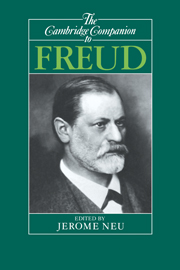Book contents
- Frontmatter
- Introduction
- 1 Freud: The psychoarcheology of civilizations
- 2 Seduced and abandoned: The rise and fall of Freud's seduction theory
- 3 Freud's androids
- 4 The interpretation of dreams
- 5 The unconscious
- 6 The development and vicissitudes of Freud's ideas on the Oedipus complex
- 7 Freud and perversion
- 8 Morality and the internalized other
- 9 Freud on women
- 10 Freud and the understanding of art
- 11 Freud's anthropology A reading of the “cultural books”
- 12 Freud's later theory of civilization
- 13 In fairness to Freud: A critical notice of The Foundations of Psychoanalysis, by Adolf Grünbaum
- Bibliography
- Cited works of Freud
- Index
- Series list
12 - Freud's later theory of civilization
Published online by Cambridge University Press: 28 May 2006
- Frontmatter
- Introduction
- 1 Freud: The psychoarcheology of civilizations
- 2 Seduced and abandoned: The rise and fall of Freud's seduction theory
- 3 Freud's androids
- 4 The interpretation of dreams
- 5 The unconscious
- 6 The development and vicissitudes of Freud's ideas on the Oedipus complex
- 7 Freud and perversion
- 8 Morality and the internalized other
- 9 Freud on women
- 10 Freud and the understanding of art
- 11 Freud's anthropology A reading of the “cultural books”
- 12 Freud's later theory of civilization
- 13 In fairness to Freud: A critical notice of The Foundations of Psychoanalysis, by Adolf Grünbaum
- Bibliography
- Cited works of Freud
- Index
- Series list
Summary
Freud in the last phase of his work gave increasing attention to questions about civilization, about its roots in and effects on human psychology. He was particularly interested in whether civilization on the whole helped or hindered human beings in their search for happiness, and he dealt with this question in two well-known books, The Future of an Illusion and Civilization and Its Discontents, the first of which he wrote in 1927 and the second in 1930. This essay is a study of differences between the views that he expressed in these two books. The differences indicate a shift in his outlook, and the essay represents an attempt to understand the reasons behind this shift.
The Future of an Illusion ends in optimism. Briefly, Freud's hopeful conclusion was this: Just as healthy individuals overcome their childish ways as they mature, as reason comes to play a greater role in the governance of their lives, so too healthy societies should overcome their primitive practices as they mature, as science comes to play a greater role in the governance of their lives. Three years later, when he wrote Civilization and Its Discontents, Freud's optimism had dimmed. He ended the work on a somber note. No one, Freud observed, in this age of great technological advances can be confident that the struggle between life-giving and life-destroying forces that shapes civilization will not have a ruinous outcome. No doubt the rise of the Nazis and the Fascists during the intervening years partly explains this shift in his outlook. But his further reflections on the nature of civilization help to explain it as well.
- Type
- Chapter
- Information
- The Cambridge Companion to Freud , pp. 287 - 308Publisher: Cambridge University PressPrint publication year: 1991
- 4
- Cited by



